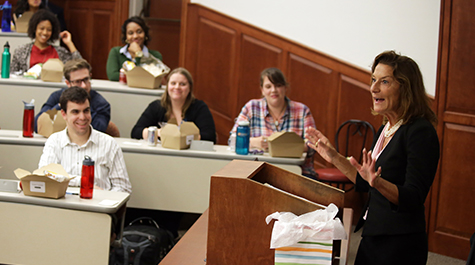Justice McClanahan Shares the Wisdom of the “72 Hour Rule” with Students
Justice Elizabeth A. McClanahan of the Supreme Court of Virginia recently met and spoke over lunch with students during an October 17 visit to the Law School. In her talk, titled “From My Heart to Yours: Managing the Stress of Law and Life,” she gave law students valuable pointers on how to manage stress in law school and the practice of law. Her visit was made possible by the Law School’s Richard A. Williamson Fellowship Program.
“I decided it was not the day for me to talk about complex intellectual questions regarding judicial philosophy, policy, and jurisprudence because, after all, fortunately or unfortunately, you can figure out what all my positions are by reading the opinions, concurrences, and dissents I have written over fourteen years,” McClanahan said to appreciative laughter from the audience.
McClanahan earned her undergraduate degree at William & Mary in 1980 before going on to study at the University of Dayton School of Law. Renowned for her work in natural resources law, she was a partner at Penn, Stuart and Eskridge, served as Chief Deputy Attorney General of Virginia, and sat on the Court of Appeals of Virginia before being sworn in as the fourth female justice in the history of the Supreme Court of Virginia in 2011.
The focus of her Law School lecture was not solely on her career in the law but also on her battle with breast cancer that began almost ten years ago. McClanahan recounted a wonderful Christmas with her children and family in 2006, a day before she received a concerning call from her doctor. By January 3, 2007, McClanahan had officially been diagnosed with cancer. What followed, she said, was “surgery, chemotherapy, pain, nausea, and–my personal favorite – baldness.” She was a judge on the Court of Appeals at the time, and at first she struggled with how best to face her illness and to continue to do the things she was passionate about.
It was during chemotherapy that she developed a coping mechanism she calls the “72 Hour Rule.”
“It dawned on me that the absolute worst time during this experience was this 72-hour window after I hit the wall. I noticed that after that time period, things didn’t get better; they weren’t miraculously over. But I could actually, after 72 hours, look at the world with more optimism. I had a different outlook after 72 hours,” McClanahan said.
She said her attitude and plans for the future always improved after that period, and she encouraged students to take the same approach to law school. Before turning in a paper, after a breakup, or at the end of exams, McClanahan advised that students always take 72 hours to let their outlook improve before taking further action.
“It’s hard to think about anything for 72 hours [in the age of Instagram, Snapchat, and Twitter] … but at its core, the essence of practicing law is thinking,” she said, as she encouraged students to take mental breaks throughout their careers. She went on to highlight the importance of collegiality, positivity, and relationships in the legal profession, all within the framework of taking time to refocus one’s outlook on the circumstances at hand.
Before taking questions, McClanahan wrapped up her talk by sharing her heartfelt pride for her alma mater and her home state. She reminisced about the excitement she felt when learning she had been accepted at William & Mary and her time at school, memories she relived at the rousing Tribe homecoming victory and during her visit to the law school.
The Williamson Fellowship Program is made possible by the generosity of the family and friends of the late Professor Richard A. Williamson. Williamson was a member of the William & Mary Law School faculty for 37 years. He also served in senior leadership roles as Dean of Admission, Vice Dean, and Acting Dean, and was William & Mary’s Coordinator of Legal Affairs for 10 years. In 2004, he received the university’s Thomas Jefferson Award, which recognizes members of the faculty for significant service, influence, and leadership.
Williamson Fellows are lawyers of extraordinary caliber drawn from law firms, the government, and the bench. Past fellows have included the Right Hon. Beverley McLachlin, Steven Perles J.D. ’75, Job Taylor J.D. ’71, William Hoffman ’67, J.D. ’77, and Kenneth Feinberg.
About William & Mary Law School
Thomas Jefferson founded William & Mary Law School in 1779 to train leaders for the new nation. Now in its third century, America's oldest law school continues its historic mission of educating citizen lawyers who are prepared both to lead and to serve.
